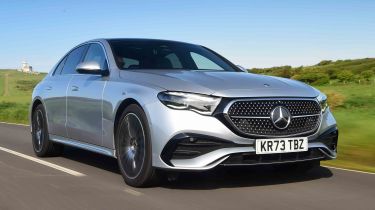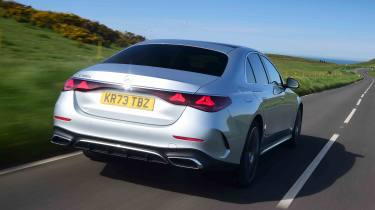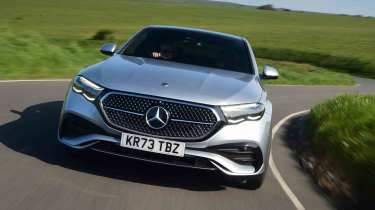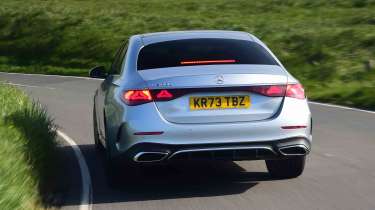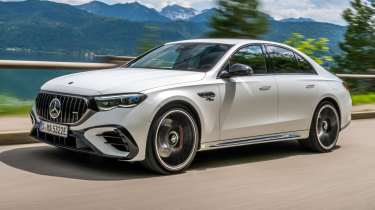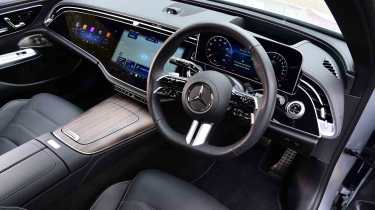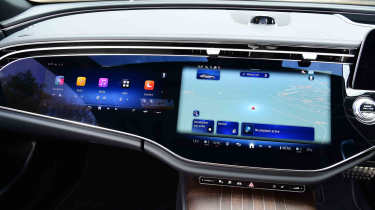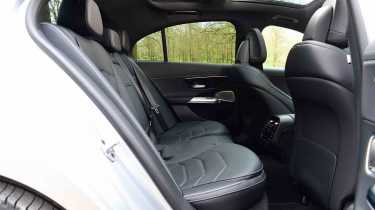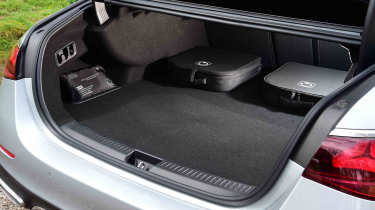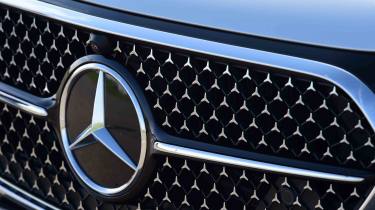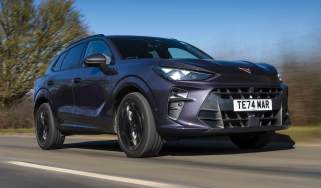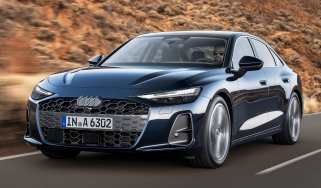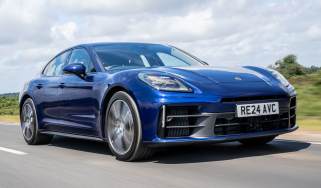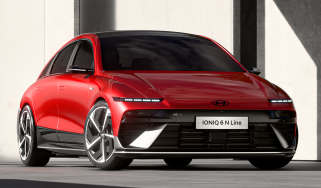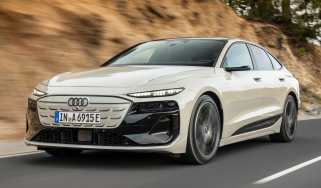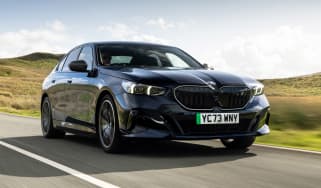Mercedes E-Class review – a smooth and refined executive saloon
“The latest Mercedes E-Class offers exceptional levels of comfort, a beautiful interior and one of the most advanced infotainment systems ever”
Pros
- Smooth, refined drive
- Beautifully finished interior
- Cutting-edge infotainment tech
Cons
- Small boot in the PHEV version
- Other rivals are more engaging to drive
- Noisy diesel engine when pushed hard
Verdict – is the Mercedes E-Class a good car?
With plenty of impressive technology, a beautiful interior and exceptional levels of comfort, the fifth-generation E-Class is the best ever. Mercedes' creation fulfils the executive car brief, although it’s not completely without issues. The passenger compartment is less spacious than you might expect, and some slightly noisy diesel engines can ruin the upmarket, civilised atmosphere the E-Class should give off. While the E-Class has the edge on comfort, the BMW 5 Series is the driver’s choice, and while both are expensive, the 5 Series looks much more affordable on a PCP deal.
Mercedes E-Class models, specs and alternatives
If you want a stylish executive saloon car, then the Mercedes E-Class has long been a staple of the brand’s lineup, facing off with its fellow German rivals: the BMW 5 Series and Audi A6. While the other two rivals have their own focus, the E-Class is a nameplate synonymous with comfort above all else, plus sophistication and premium feel.
In the last decade or so another threat has emerged, however, by way of the popularity of premium SUVs. These offer added practicality, a high driving position, soft ride and dominant road presence, but there’s arguably still nothing that quite equates to the image that a sleek executive saloon provides.
 The best saloon cars to buy in 2025
The best saloon cars to buy in 2025
As usual, there’s a lot riding on the Mercedes E-Class. Despite the lack of an electric version – that niche is covered by the Mercedes EQE – it does get a range of petrol and diesel engines which are electrified in some way (with mild-hybrid technology at least).
More reviews
In-depth reviews
The inclusion of the diesel Mercedes E 220 d and E 450 d models in the E-Class lineup is in contrast to BMW’s decision to discontinue diesels completely for the latest 5 Series, so the Mercedes may gain an edge in appealing to long-distance motorway drivers. While the diesel engines are certainly efficient, they’re quite noisy when pushed hard and aren’t the best choice if you want a tranquil atmosphere in the cabin.
As with the last E-Class, there’s a plug-in hybrid Mercedes E 300 e model on offer – it uses the same 2.0-litre, four-cylinder petrol engine, paired with a powerful electric motor and battery. Mercedes has even added a 300 de model that pairs a diesel engine with an electric motor, making for even lower running costs. On the official tests, these combinations allow for an impressive 61 to 70 miles of driving on electric power alone in the saloon version, depending on the trim.
A top-of-the-range performance E 53 AMG model was introduced later, which uses a plug-in hybrid system consisting of a turbocharged 3.0-litre straight-six petrol engine and electric motor which combine to produce 585bhp (or up to 603bhp with the AMG Dynamic Plus package’s Race Start function enabled).
Avantgarde trim has been skipped for the UK market, as Mercedes reckons British tastes are more aligned towards the sportier look of the AMG Line models. These ascend through AMG Line Advanced, AMG Line Premium, AMG Line Premium Plus. There’s also an Exclusive Edition model at the top of the standard lineup which will appeal to you if you want slightly classier styling, as it gets the subtler, classic chrome grille with the small Mercedes emblem on the bonnet.
As the E-Class range forgoes the entry-level model offered in other markets, buyers are likely to find even AMG-Line is well-equipped enough, but we’d recommend stepping up to AMG-Line Advanced if you want handy features like high-beam assist, four-zone climate control and a 360-degree camera.
While some other executive saloons – such as BMW’s 5 Series – are more fun to drive, the E-Class has always had a more comfort-focused edge. The Audi A6 is another alternative to the E-Class, and while it’s a great all-rounder, it doesn’t stand out quite as strongly in any one area as the 5 Series and E-Class do. While the Lexus ES is a worthy, yet left-field alternative to the better-established German cars, the E-Class’ reputation and brand image mean it’s more likely to win you over. Likewise, while the Volvo S90 is slightly more comfortable than the E-Class, the prestige of a Mercedes badge is likely to be more enticing to buyers in this market.
| Trim levels | Power options |
|
|
Mercedes E-Class alternatives
MPG, running costs & CO2 emissions
With every powertrain option in the latest version of the Mercedes E-Class getting some form of at least mild-hybrid electrification, the medium-sized executive saloon is more economical than any of its predecessors.
The mild-hybrid engine options consist of an entry-level E 200 petrol model with an official fuel economy figure of just over 44mpg. Next up is the diesel E 220 d with an official fuel economy of just under 59mpg. Those are impressive figures for a non-plug-in version of a car this size. In our experience, the E 220 d’s figure felt very doable, which is impressive given the car’s large size and weight. The all-wheel-drive diesel E 450 d 4MATIC has a slightly worse fuel economy figure of up to 47mpg – a price you’ll pay for the benefit of improved traction.
As before, the latest E-Class is offered with petrol or diesel plug-in hybrid technology – badged E 300 e, the petrol model pairs a 2.0-litre four-cylinder engine with an electric motor. Keep it charged up and running on electric power regularly and you can greatly reduce running costs for shorter trips. The 300 de diesel plug-in hybrid model is even more efficient, and will make sense if you want to do long-distance motorway mileage and the ability to cover short trips on electric power.
The plug-ins get an official range of between 58 to 70 miles in saloon form, and 56 to 67 miles in estate guise. Because of this capability, the E 300 e gets an impressive fuel economy figure, with an official 470.9mpg and rock-bottom CO2 emissions of 13g/km. The 300 de, however, is the model with the lowest fuel consumption of the entire range, with an official lofty 706.3mpg figure and even lower CO2 emissions from just 11g/km.
Mercedes’ high-performance AMG 53 model also uses plug-in hybrid technology, so despite the high power output, its system can achieve up to 313mpg and low CO2 emissions of only 22g/km. Be aware that in the case of any plug-in hybrid vehicle – although the mpg figures look particularly impressive on paper, you’re unlikely to be able to achieve these in the real world unless you keep your E-Class charged up regularly and only drive short distances.
Company car buyers will be best served by the plug-in hybrid thanks to its exceptionally low emissions meaning it will sit in some of the lowest BiK (Benefit-in-Kind) bands.
| Model | Fuel economy | CO2 emissions |
| E-Class E 200 | 44.1mpg | 144g/km |
| E-Class E 220 d | 53.5mpg | 125g/km |
| E-Class E 450 d 4MATIC | 47.1mpg | 130g/km |
| E-Class E 300 e | 470.4mpg | 12g/km |
Insurance
The latest Mercedes E-Class starts in insurance group 42 for the AMG-Line model in entry-level E 200 petrol guise and E 220 d diesel guise. Beyond this, insurance groupings rise quite sharply, with the E 300 de plug-in hybrid in Urban Edition sitting in group 49 and all other versions in the top group 50 out of 50. That means all versions of the E-Class look likely to be expensive to insure.
Engines, drive & performance
For this iteration of the Mercedes E-Class, all the engines come with some form of electrification, be that mild-hybrid or plug-in hybrid technology. No E-Class is a true driver’s car, because the focus here is on a smooth and comfortable drive, as opposed to driving thrill or engagement, despite what the higher-end plug-in models’ large power figures may suggest on paper. There’s a Sport mode that firms up the suspension and sharpens the gearbox, but the Comfort setting is more in line with the E-Class’ character. It’s a heavy car, and while the E-Class has plenty of grip and steering is responsive, keen drivers would be better served by a BMW 5 Series.
In any guise, the E-Class is a heavy car and that does impact how it drives. The steering is light and responsive and there’s lots of grip on offer, but there’s no escaping the feeling of all that mass when you push it. Keen drivers would be better served by a BMW 5 Series.
We’ve driven the E-Class with and without the optional air suspension. With it fitted, it was evident that Mercedes had upped the ante on the latest E-Class in terms of comfort. This was all even more impressive given our test car’s 21-inch alloy wheels. The car has a longer wheelbase than before, which helps to improve its ride and stability. At low speeds the E-Class feels sophisticated and refined, ironing out bumps in the road – it felt smooth even driving over manhole covers and tram tracks. At higher speeds, it was just as refined, with minimal wind rustle, excellent suppression of powertrain noise and reassuring composure.
There’s very little wind noise once you reach cruising speeds and tyre noise is also kept to a minimum. The E-Class is a great car in which to travel in comfort, and we get the feeling you could spend hours riding along and still step out feeling refreshed at your destination.
When fitted with 20-inch wheels on standard suspension, the E-Class felt a little fidgety over rougher roads – we suspect smaller 18 or 19-inch wheels would take the edge off somewhat. If comfort is the priority, which we’d suspect is the case in a premium executive model, we’d recommend springing for the air suspension.
On tighter roads with multiple corners, the E-Class isn’t as balanced or poised as the 5 Series, but that’s never been its goal. The steering still felt well-weighted and accurate and body roll was kept to a minimum. This was all even more impressive given our test car’s 21-inch alloy wheels.
In the AMG 53 we were particularly impressed with its ability on the motorway – while it may not be as theatrical and hardcore as the old V8 engine from the E 63 S, it’s much more calm and capable than the turbocharged four-cylinder you’ll find in the lesser C 63 S, which can feel rather strained at times.
Even on twistier, more challenging roads, the E 53 AMG feels well-sorted thanks to a suspension setup that strikes a perfect compromise between good ride quality and composure. One minor gripe is that the steering feels unusually light for a sporty model like this and there’s no ability to adjust it.
There’s very little feeling through the steering wheel, and this is also the case with the brakes. They’re not terrible, but other plug-in hybrid systems, such as that of the Porsche Panamera do a better job at blending regenerative and mechanical braking. All in all, anyone hoping for the sheer excitement and driving feel of the old E 63 S might be a little disappointed with the E 53 AMG, but as a punchy middle ground between the standard plug-in hybrid E-Class and an out-and-out sports saloon, it’s undeniably good, especially when taking into account its potential to be both efficient and very quick.
Diesel models
The diesel models will appeal to long-distance motorway drivers, but can be a little noisier than we’d like when you put your foot down. The 48-volt mild-hybrid system does smooth out responses and the nine-speed automatic gearbox is smooth, however the serenity of the cabin is massively interrupted when getting up to speed as it has to work hard. Once it gets there, it sits comfortably and quietly at around 1,500rpm.
The 220 d diesel models use a 2.0-litre engine which produces 194bhp, while the E 450 d 4MATIC has a much larger 3.0-litre engine producing 362bhp with four-wheel drive, which gives added traction and a much quicker 4.8-second 0-62mph time compared to the E 220 d's 7.6-second figure.
| Model | Power | 0-62mph | Top speed |
| E-Class E 220 d | 194bhp | 7.6s | 148mph |
| E-Class E 450 d 4MATIC | 194bhp | 4.8s | 155mph |
Petrol models
We tested the E 200 entry-level petrol model and were impressed by how smooth it felt on the move. It uses a mild-hybrid 2.0-litre engine with 201bhp and is capable of 0-62mph in 7.5 seconds with a 149mph top speed. Setting off, the mild-hybrid assistance meant that the petrol engine never felt strained, and the nine-speed automatic transmission shifts seamlessly through the gears. At higher speeds on the motorway, the petrol engine was extremely quiet and dignified, allowing the driver to glide along comfortably.
| Model | Power | 0-62mph | Top speed |
| E-Class E 200 | 201bhp | 7.5s | 149mph |
Plug-in hybrid models
The latest E-Class originally launched with just the one 300 e petrol plug-in hybrid model, but Mercedes has since relaunched the diesel plug-in hybrid 300 de and a sportier E 53 AMG model. The E 300 e makes use of a 2.0-litre petrol engine paired with an electric motor for a system output of 308bhp and a 0-62mph time of just 6.5 seconds along with a top speed of 141mph – while this is quick on paper, the added weight and Mercedes' focus on comfort means it doesn't feel particularly sporty to drive. The E 300 de actually matches these performance figures almost exactly.
The E 53 AMG performance model is a plug-in hybrid which, rather than using a four-cylinder, pairs the electric motor with a punchier 3.0-litre straight-six. That gives it a whopping 577bhp, which means it goes from 0-62mph in 3.8 seconds and onto a 155mph top speed.
| Model | Power | 0-62mph | Top speed |
| E-Class E 300 e | 308bhp | 6.5s | 141mph |
| E-Class E 300 de | 308bhp | 6.6s | 140mph |
| E 53 AMG | 577bhp | 3.8s | 155mph |
Interior & comfort
One of the standout features of any Mercedes model in recent years has been the brand’s impressive interior design and build quality. Material quality is impressive, and the seats are supportive, while hi-tech touches include motorised air vents allowing passengers to direct airflow through the climate controls, and the ambient interior lighting looks particularly impressive at night.
For some buyers after a spacious executive car, though, the E-Class’ interior setup might actually be a little off-putting – in our AMG Line Premium Plus test model, it almost felt like there was too much gadgetry, as if some elements have been crammed in at the expense of cabin space.
For example, the digital driver’s display sits quite close behind the steering wheel, and with the long swooping MBUX superscreen spanning the dashboard plus the high centre console between the front occupants, you feel more enveloped than in a usual car of this class. The same could be said of the rear, too, with a surprisingly tight amount of space for backseat passengers, which has been compromised by a high and wide central hump in the floor, limiting food space.
The majority of the range gets sporty AMG-Line styling, while the Exclusive Premium and Exclusive Premium Plus models costing the same as AMG Line Premium and AMG Line Premium Plus versions swap this look for a more traditional, classic design with a chrome bar grille and smaller Mercedes emblem atop the bonnet.
In mid-2024, Mercedes also introduced an ‘Urban Edition’ model available as a new entry point for the 300 e and 300 de PHEVs. In terms of spec, Urban Edition cars are quite similar to AMG Line cars, but get larger 20-inch alloys.
The high-performance E 53 AMG model is available in Premium, Premium Plus and Edition 1 specifications that are most similar to the top-spec AMG Line Premium and Premium Plus specs, although they get sportier, unique AMG styling. Edition 1 cars add model-specific Nappa leather with yellow stitching and a passenger display with a 12.3-inch screen and a selfie and video camera function.
A neat feature of the latest E-Class is ‘4D’ audio, first introduced on the S-Class. The premium Burmester sound system sends bass and the rhythm of the music thumping through the seats for a more engaging experience.
Infotainment and navigation
The E-Class gets a 12.3-inch digital instrument cluster and a 14.4-inch central display which Mercedes calls the Superscreen. A 12.3-inch passenger screen can also be specced on the model and comes as standard on AMG Line Premium and above, providing access to video streaming platforms to keep occupants entertained while they ride along. It’s got clever pixel-filtering technology that means videos get hidden from the driver’s line of sight, too, so they won’t get distracted.
We liked the E-Class’ head-up display, too – this puts all the most important information in front of the driver allowing you to keep your eyes on the road at all times.
Mercedes has used the very latest MBUX infotainment system software in the E-Class, which was actually intended for the brand’s next-generation vehicle platform coming next year, so it’s actually currently much more advanced than that of the larger Mercedes S-Class. It comes with quirky hi-tech features such as a camera lens facing the occupants on top of the dashboard for taking selfies or for using video-conferencing software like Zoom when you’re parked up.
Mercedes’ voice recognition functionality is more advanced than ever before, too. You can get the system to follow more complex demands like turning on the heated seats and picking a warmer interior ambient lighting setting only if the cabin drops below a certain temperature. The car’s AI systems also analyse your habits and adapt settings accordingly – for example, it may turn on the seat massage function if it notices you always do it at the same time every morning.
When we tested it, a command such as “I need a haircut” brought up a list of local barber shops with Google review ratings.
While Apple CarPlay and Android Auto are on the shopping list of many car buyers, Mercedes’ MBUX system might be one of the rare instances when you’d prefer to use the manufacturer’s own system – it’s incredibly impressive and has much of the same functionality as those systems. , while the on-screen tiles are huge so there’s no chance of hitting the wrong one on the move.
Key features | |
|
AMG Line
|
Urban Edition AMG Line plus...
|
|
AMG Line Premium AMG Line plus...
|
AMG Line Premium Plus AMG Line Premium plus...
|
|
Exclusive Premium AMG Line Premium plus...
|
Exclusive Premium Plus AMG Line Premium Plus plus…
|
Practicality & boot space
Despite the E-Class’ extended wheelbase compared to the old model, the interior can feel a little more cramped than you’d expect of a car from this class. Up front, while the interior design certainly looks attractive, the large centre console and dashboard cocooning the driver can feel a little claustrophobic.
In the back, the outermost seats are sculpted to support the passengers, but kneeroom is limited due to the large front seats, and the centre-rear seat feels quite cramped, so isn’t suited to longer trips.
| Size comparison | |||
| Model | Length | Width | Height |
| Mercedes E-Class saloon | 4,949mm | 1,880mm | 1,468mm |
| BMW 5 Series saloon | 4,936mm | 1,868mm | 1,467mm |
| Audi A6 saloon | 4,951mm | 1,886mm | 1,458mm |
| Jaguar XF saloon | 4,962mm | 1,890mm | 1,456mm |
Boot space
Boot space is on par with the outgoing E-Class, at 540 litres for the non-PHEV models, which is big for a saloon car and beats all of the E-Class’ direct rivals.
That’s not the full story, however, because this is reduced to 370 litres for the PHEV versions as a result of the extra space taken to accommodate the electric motor and battery. The amount of room offered is actually 30 litres down on the outgoing PHEV models of the E-Class and less than that of the BMW 5 Series PHEV.
Mercedes has at least put some thought into the cargo area, though, with small hooks that help with carrying smaller items and stops them moving around, while you can fold the back seats down easily with remote buttons.
| Boot space comparison | |
| Model | Boot space |
| Mercedes E-Class saloon | 540 litres (PHEV 370 litres) |
| BMW 5 Series saloon | 530 (PHEV 410 litres) |
| Audi A6 saloon | 530 |
| Jaguar XF saloon | 459 |
Reliability & safety
While the latest E-Class didn’t appear in the 2024 Driver Power customer satisfaction survey, it’s safe to say Mercedes as a brand hasn’t fared too well in recent years. It came in 25th place out of 32 manufacturers in the latest survey, behind all its major rivals apart from Audi which placed in 27th.
Reliability has not been one of the brand’s strong points, with 26% of Mercedes respondents reporting an issue with their car in the first year of ownership, according to the survey. That’s a higher proportion than that of all its rivals including Audi, despite its lower placing overall.
Safety
The Mercedes E-Class was crash-tested by Euro NCAP in October 2023, achieving the full five stars, meaning it should be very safe. The E-Class’ impressive score is thanks in large part to its extensive suite of safety assistance systems, as the executive saloon scored particularly highly in this area. During the engineering process, Mercedes also said a lot of thought went into creating a ‘particularly rigid passenger cell’ to protect occupants, and seat belts and airbags that can actively adapt to the situation in the event of a crash.
The E-Class can be specced with autonomous emergency braking tech, collision warning tech that works with traffic up ahead and crossing traffic at junctions, an evasive emergency steering assist feature, blind spot assist, and ‘Pre-safe Plus’ – a system that detects if there is a risk of rear-end impact and warns drivers behind by activating the rear hazard warning lights and prepares occupants for impact by activating the seat belt tensioners. There’s even an ‘Energising Comfort’ system that helps to perk the driver up in case of fatigue via a program of music and lighting (as well as being able to help them relax when stressed or help reduce car sickness.)
Which Is Best?
Cheapest
- NameE200 AMG Line 4dr 9G-Tronic
- Gearbox typeSemi-auto
- RRP£55,710
Most Economical
- NameE300e Urban Edition 4dr 9G-Tronic
- Gearbox typeSemi-auto
- RRP£65,200
Fastest
- NameE450d 4M AMG Line Premium 4dr 9G-Tronic [Pan Roof]
- Gearbox typeSemi-auto
- RRP£79,870
